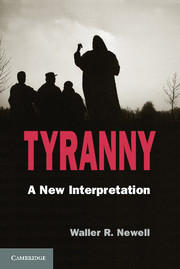Book contents
- Frontmatter
- Contents
- Acknowledgments
- Introduction
- 1 Is There an Ontology of Tyranny?
- 2 The Tyrant and the Statesman in Plato's Political Philosophy and Machiavelli's Rejoinder
- 3 Superlative Virtue, Monarchy, and Political Community in Aristotle's Politics
- 4 Tyranny and the Science of Ruling in Xenophon's Political Thought
- 5 Machiavelli, Xenophon, and Xenophon's Cyrus
- 6 Glory and Reputation
- 7 The Republic in Motion
- Conclusion
- Epilogue
- Bibliography
- Index
- References
Introduction
The Conquest of Eros
Published online by Cambridge University Press: 05 May 2013
- Frontmatter
- Contents
- Acknowledgments
- Introduction
- 1 Is There an Ontology of Tyranny?
- 2 The Tyrant and the Statesman in Plato's Political Philosophy and Machiavelli's Rejoinder
- 3 Superlative Virtue, Monarchy, and Political Community in Aristotle's Politics
- 4 Tyranny and the Science of Ruling in Xenophon's Political Thought
- 5 Machiavelli, Xenophon, and Xenophon's Cyrus
- 6 Glory and Reputation
- 7 The Republic in Motion
- Conclusion
- Epilogue
- Bibliography
- Index
- References
Summary
Tyranny is elusive. Although everyone wants to be known as just, especially when they are not, no one wants to be known as a tyrant, especially when they are. Yet this most elusive of political phenomena is one of the most widespread and shockingly real. From the innermost sanctum of the household to the politics of nations and empires, there are victims and there are oppressors. Civil war, revolution, terrorism, superpower conflict – in all these spheres of human violence, the pursuit of power over others is accompanied by the furious or heartrending demand for justice, whose first act must be to expose the aggressor for what he or it truly is. The dilemma is only complicated by the fact that, as students of politics from Aristotle to Abraham Lincoln have observed, the would-be tyrant may appear in the guise of a liberator. More extraordinary still, in the modern age, our potential oppressors are sometimes not necessarily human at all – technology is a faceless, impersonal power that nevertheless could destroy the entire planet or, some have argued, terrify us into peace and moderation. Hence one of the oldest themes in political philosophy and one of the most lastingly relevant: Who and what is the tyrant?
The word tyrannos in ancient Greek meant a ruler without ancestral descent from a lawful king, a basileus. A basileus was sometimes a semisacerdotal figure, sometimes, as in the Spartan dual monarchy, exercising military command. Often a king was seen as a kind of father of his people, a link to the ancestors and the womb of the country, and to the gods themselves, who were the fathers of the fathers. By contrast, a tyrant was often a “new man,” someone who seized or usurped exclusive power, whether over a formerly free people or by taking the place of a lawful king. Sometimes their rule was violent or began in violence, but tyrants could also be recognized as benevolent, better at the art of ruling than a legitimate king, and so successful that their position might become hereditary for a time. However, they never entirely escaped the taint of illegitimacy. Hence Max Weber derived his famous category of “charisma” from Sophocles’ Oedipus the Tyrant.
- Type
- Chapter
- Information
- TyrannyA New Interpretation, pp. 1 - 25Publisher: Cambridge University PressPrint publication year: 2013

